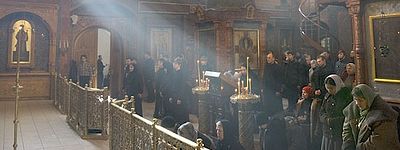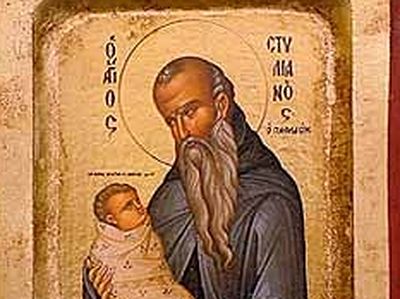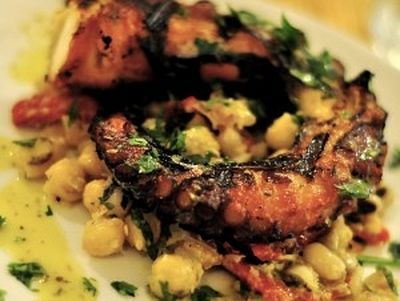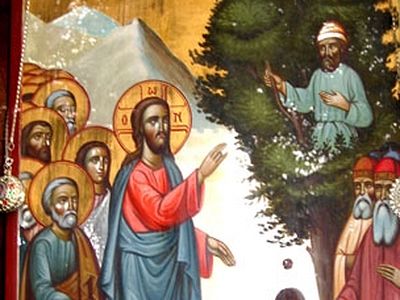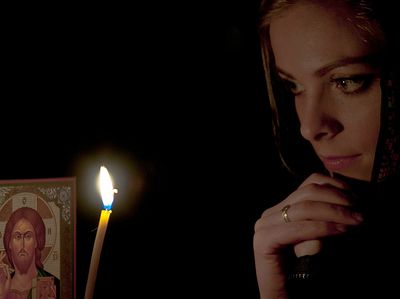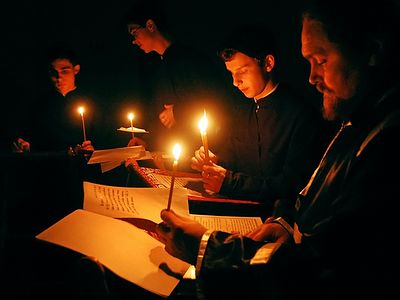The following is from a discussion on Ancient Faith Radio, by Fr. Evan Armatas and John Maddox, as part of their "Orthodoxy Live" program. This discussion is especially aimed at those who are new to Great Lent, but even those who have been practicing the Lenten fast all their lives will find much interesting and helpful information that they may not already know. More questions about Great Lent can be asked on the "Orthodoxy Live" homepage, on their website.
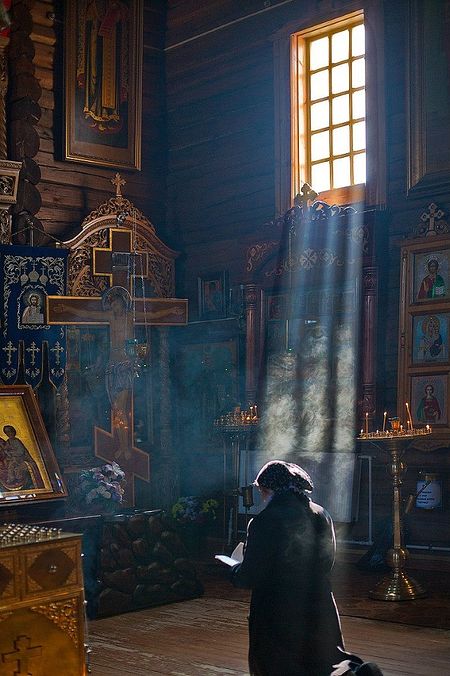 Great Lent. Photo: Ilya Shpagin.
Great Lent. Photo: Ilya Shpagin.
John Maddox: Well, now that we are in this first week of Great Lent, tell us what happens?
Fr. Evan: The Church begins Great Lent with a day we call "Clean Monday". Often it was a day, and in my own time, with my family, it would be a day of an absolute fast. No food or drink the entire day until the evening meal. Many parishes often hold a retreat on that day, concluding it with the first service of Great Lent, Great Compline. And after Great Compline or during it is read the canon of St. Andrew of Crete, during the first four days of Great Lent.
So, we are into the season. We are in the fast; and from here until its conclusion, the Church dons the clothes of repentance—changing them on the weekends for the celebration of the Liturgy. But the typical services we see for most parishes (that are unable to do the whole cycle of services) will be Great Compline, which is an evening service, the last liturgical service of the day, and the service of the Hours. On Wednesdays and Fridays we have the Liturgy of the Pre-Sanctified Gifts, which is a Liturgy without the consecration. A pre-consecrated host from the previous Sunday is used during Vespers, which includes a reading from the Old Testament and Psalms, and the faithful receive the host in the evening. The idea in this is that most of the faithful are in a heightened spiritual state, and they need the Lord; they can't make it from Sunday to Sunday without receiving the Holy Eucharist. We keep also in mind, that the Church is in a penitential period, and we cannot celebrate the Divine Liturgy during the week. It would not be proper to the season. So, during the week the Church does not hold its usual celebration for the commemoration of saints, or any of the liturgical days of the year in which a Liturgy would be celebrated. During Great Lent, these celebrations are prohibited. Thus, the Pre-sanctified Liturgy is given as a means of sustaining the people through the journey with the Body and Blood of our Lord during the week. This is also celebrated in many parishes on Friday morning.
On Friday evening, many [Greek] parishes read a portion of the Akathist to the Mother of God—a supplicatory service that is read for the first four Fridays. On the final Friday, the complete (Akathist) service is done. On Saturdays there are often what we call the Saturday of the Souls, which are special Liturgies served in commemoration of those who have passed from this life into the next. On Sundays in Great Lent, the Church will use the Liturgy of St. Basil the Great. Most of us who have gone through the Liturgical year have grown accustomed to the Liturgy of St. John Chrysostom. But now we will use the Liturgy of St. Basil the Great, which has differences, primarily in the priestly prayers. A couple of hymns to the Mother of God are also added after the consecration. The Liturgy itself, the priestly prayers, are longer. They are more ancient, and more fitting for the season we are in.
So, as we move through Great Lent, to give just a brief orientation, there are five Sundays. The first Sunday is known as the Sunday of Orthodoxy. It also has a reading from the Gospel of St. John, the first chapter, verses forty-three through fifty-one. This service is one that many people are accustomed to and love to attend, because in it we celebrate the return of icons to the Church; we read the decree from that Council and we process the icons during the Service.
The second Sunday is known as the Sunday of St. Gregory Palamas, and on this Sunday we read from the Gospel of St. Mark, 2:1-12. I'm giving these scripture readings because they are the second theme that fits on each Sunday. The theme of the Sunday of Orthodoxy, the theme of the Sunday of St. Gregory Palamas—these are themes that were added to the thematic element contained within the Gospel reading for the day.
Then we move to the third Sunday of Great Lent known to us as the Sunday of the Adoration of the Cross. We are then mid-way into Lent, so it would make sense for us to mark this day by recognizing where this story is going to end—with the Crucifixion of the Lord; and where the story will pick up—with Christ being taken down from the Cross, the entrance into the tomb, and His Resurrection on the third day. The Gospel reading for this is appropriate: St. Mark chapter 8:38-9:1—the mid-point and fulcrum of St. Mark's gospel.
The fourth Sunday of Lent is the Sunday of St. John of the Ladder, the great ascetic. His work, The Ladder of Divine Ascent is read each Lent in every Orthodox monastery throughout the world. It details the spiritual journey that man goes through in his ascent towards God. The Gospel reading on that Sunday is St. Mark 9:16-30.
Then, finally, we come to the last Sunday of Great Lent, the Sunday of St. Mary of Egypt. For those of our listeners who have never heard of St. Mary of Egypt or never read her story, it is a story that is so worth reading and examining as an archetype of ourselves, and example of what can happen through repentance. The Church decided to take this saint and place her on the last Sunday of Lent in case we had missed the whole point of what is going on. It's true for many of us that we don't make amends until the last minute. And the story of St. Mary of Egypt gives us some encouragement. So, this story of her life is highlighted by the Church and the Gospel passage, which is not directly connected to it, from Mark 10:32-45. Along with it are Epistle readings from the Book of Hebrews. This now brings us back to what we were saying earlier about some of the related themes, and the context for Great Lent. Here we want to note that the readings accompanying the Sundays of Great Lent are really most appropriate for those who are preparing through this season to be baptized and brought in as newly illumined members of the Faith. This is one of the earliest reasons for the season of Great Lent. When we talked about this earlier, you highlighted the fact that many people may not know this.
John Maddox: Yes, that was certainly new to me, and it was one of my early recognitions of the importance of community.
Fr. Evan: Yes, if you think about it, we often think of the mysteries or sacraments of the Church in a personal, individual way. We even look at our life as, “me and Jesus”, and this does great damage to the Gospel and the words of Jesus Christ, when He said "Where two or more are gathered in my name, there I am also." Christ's presence in the Church is within the community. God himself lives in a triunial nature—a divine community of Three Persons who live in a relationship of pereosises—a mutual indwelling, a dance of love, if you will. So the community is preparing and preparing alongside those who are about to enter into the Church through holy illumination, or Baptism. So, you see that the Gospel readings and the epistle readings, and even the prayers for the catechumens that happen during the middle of the week, are all elements that were developed by the Church to help those in the final weeks of preparation; to help the community, and have the community participate with them in their final preparation and entrance into the Church. But that's not the whole story. This Lenten season was also the season for those who had left the faith, those who had apostatized, those who had committed grave sins like murder or adultery. This was the season in which they were restored. So, it's still true that this is how we use the season: to restore those who have soiled their baptismal garment.
John Maddox: It sounds like a recalibration.
Fr. Evan: Yes, and for us, who like the young man who said to me just a couple of days ago, "I need Great Lent", whether we are in those final days of preparing for our own baptism or not, we do recognize that this is a season in which we recalibrate, recommit, and renew our relationship to Christ.
John Maddox: It is so important.
Fr. Evan: It is so important; and the season itself posits questions and themes that help us highlight the distance between ourselves and God. It's not as if God goes away somewhere during the year—but we certainly do. We certainly journey away from Him in all manner of ways.
John Maddox: As my old youth group pastor used to tell us, "If you don't feel as close to God as you once did, guess who moved?"
Fr. Evan: So, within this season the theme of repentance, the theme of return, the theme of preparation, the theme of judgment, the theme of humility—are our constant companions along with all this spiritual exercise and discipline of the Christian life. It's interesting to note that when we look at the Sermon on the Mount in Matthew 5:7, the Lord seems to be giving us a summary of the Christian life. He speaks of three spiritual disciplines that form the supports to the Christian life. We are to look at the Christian life as a stool, and if we were see ourselves as seated firmly upon it in the household of God, these three disciplines are: prayer, fasting, and giving alms. Furthermore, the Lord doesn't make these optional. He doesn't say, "If you pray", but He says, "When you pray." So, in the season of Great Lent we are invited into these disciplines.
These ascetical disciplines are fasting, prayer and almsgiving. These three disciplines reorient the human being into a right relationship with God that returns us to a state more akin to what mankind was like before the fall. They divorce us from worldly cares and concerns, worldly thoughts and pursuits, and return us to Godly pursuits. In fact, in practicing these disciplines it is not about what you are giving up, it is about what you are gaining. I think it is dangerous to say, "Oh, I'm going to do this or that", talking about all the things we are unfortunately going to have to give up during the Lenten season. I would say to our listeners: trust me on this one. If you enter into this season and you avail yourself of the opportunity to fast, to give alms, and to pray, you are going to be astounded at what you gain. This is an opportunity to become more human, not less.
John Maddox: Who was it that used the term "Bright Sadness"?
Fr. Evan: This is our harmalipy; it is a phrase that comes from our patristic sources. I can't recall exactly where it was used first—perhaps the fourth to sixth century. It is a patristic word, an invented word of the fathers. "Joyful sadness". They put two words together. And it's true—this conditions the whole season. Of course there are many other spiritual disciplines the Church highlights: prostrations, which is physical prayer; the repetition of the Jesus prayer in greater earnest; standing in Vigil; the use of the repentant prayer of St. Ephraim the Syrian. There are often other things that accompany this season such as the Sunday of Pan-Orthodox Vespers, where we get together with our sister parishes and celebrate the Vespers service of Sunday night together. There are frequent retreats and pilgrimages. Our community, for examply, always takes a pilgrimage to a monastery during this season. There are a number of things that come into the season. We are used to eating certain foods, but it's not just about fasting from meat, dairy, fish, oil, and wine. It's about the simplicity and the quantity of food we are eating. This also leaves more time for prayer and acts of charity. I don't think there is any patristic source that disconnects praying from almsgiving. We have more money in our pocket to give to the poor and to feed them with the food we are no longer eating. So, these are all interconnected disciplines.
John Maddox: It's not something that you do on your own. We enter into this as a community, as a family, and enter in as much as we can. For some people it's impossible to participate in absolutely everything offered by the Church. You do what you can, right?
Fr. Evan: Yes, and I think that’s the idea. There is only one sermon that I know of that the Church has required us to read in a service, and that is the homily of St. John Chrysostom, which is read during the Paschal Vigil. The theme of that sermon is exactly what you just pointed out. He commends those who have begun the fast from the first hour and he encourages those who have shown up at the last. He tells both neither to boast nor be discouraged, but rather sit down, side by side, and celebrate the Lord's victory over death. So, we are reminded as we conclude our services of Holy Week that it is really a matter of grace, and it doesn't matter when we come to the table—it only matters that we do come to the table. Enter the fast as best as you can. Strive and endeavor to incorporate these elements into your life.
Well, we have been discussing Great Lent for an hour, but we really have only scratched the surface. I think that in order to do the subject justice, it would be best if we reserve our comments about the Saturday of Lazarus, Palm Sunday, and Holy Week to another broadcast.
John Maddox: Well, yes, and that will allow us to go a little deeper into those important days of Pascha, and the Paschal season following it.
Fr. Evan: I agree. We have had an opportunity to talk in part about the reality of Great Lent, the period that comes before Lent, some of the themes and ideas involved, and, as we mentioned, we hope we'll have an opportunity to talk more in depth about Holy Week and the two-day celebratory period of the Saturday of Lazarus and Palm Sunday that proceeds Holy Week in a later program. But I would like to wrap up with an invitation for people to listen to a separate podcast that we did on some of the specific resources that I've developed with my parish, for young adults, adults, families, individuals, and even parishes, church schools, and youth programs.
John Maddox: That's right. If you have a family and you are moving into this period of Great Lent, maybe for the first or second time, and you're wondering how to bring the whole family together on this journey, these resources will help. You can visit them on the Ancient Faith Radio homepage.
